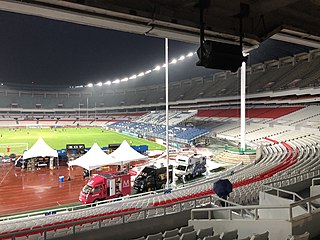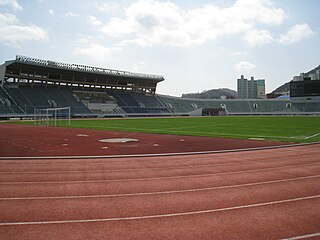
Dongdaemun Stadium was a sports complex in Seoul, South Korea and included a multi-purpose stadium, a baseball park and other sports facilities. It was located near Dongdaemun or Great East Gate. The surrounding Dongdaemun market had many vendors selling athletics-related goods. It was demolished in 2008 to make way for the Dongdaemun Design Plaza & Park.

The Seoul Olympic Stadium, also known as Jamsil Olympic Stadium, is a multi-purpose stadium in Seoul, South Korea. It is the main stadium built for the 1988 Summer Olympics and the 10th Asian Games in 1986. It is the centrepiece of the Seoul Sports Complex in the Songpa District, in the southeast of the city south of the Han River. It is the largest stadium in South Korea.
An association football tournament was played as part of the 1988 Summer Olympics. The tournament featured 16 men's national teams from six continental confederations. The teams were drawn into four groups of four with each group playing a round-robin tournament. At the end of the group stage, the top two teams advanced to the knockout stage, beginning with the quarter-finals and culminating with the gold medal match at the Seoul Olympic Stadium on 1 October 1988.

The Gwangju World Cup Stadium is a multi-purpose stadium in the South Korean city of Gwangju. It is managed by the Sports Support Division of the Culture & Sports Policy Office of the Gwangju Metropolitan city. Initially the stadium was named Gwangju World Cup Stadium to host some matches of the 2002 FIFA World Cup. To honour the former South Korean national team coach Guus Hiddink, who helped the team advance to the semi-finals, for the first time in its history, by defeating Spain in this stadium, they have also named it the Guus Hiddink Stadium.

Zambia competed at the 1988 Summer Olympics in Seoul, South Korea.

Suwon Sports Complex is a group of sports facilities in Suwon, South Korea. The complex consists of the Suwon Stadium, Suwon Baseball Stadium, and Suwon Gymnasium.

Gwangju Mudeung Baseball Stadium is a baseball stadium in Gwangju, South Korea. It is used mostly for baseball games and was the home stadium of Kia Tigers, formerly the Haitai Tigers, between 1982 and 2013.

Seongnam Sports Complex is a group of sports facilities in Seongnam, South Korea.

The Busan Gudeok Stadium is a multi-purpose stadium in Busan, South Korea. It is currently used mostly for football matches. The stadium currently holds 12,349 spectators. The venue opened in September 1928 as Busan Municipal Stadium. During the 1988 Summer Olympics, it hosted some of the Olympic football matches. It was also the main venue for the 1997 East Asian Games hosting the opening and closing ceremonies, as well as the athletics and football competitions. Professional football team Busan IPark have played their home games at the venue since 2015 as well as between 1987 and 2002. Additionally, non-league football team Busan Transport Corporation FC have played their home games at the venue since 2006.

Daejeon Hanbat Sports Complex is a sports complex, comprising a multi-purpose stadium, a ballpark, Basketball courts, tennis courts and various other sports facilities in Daejeon, South Korea.

The Daegu Civic Stadium (Korean: 대구시민운동장) was a stadium in Daegu sports complex in Daegu, South Korea. The former main stadium was used mostly for football matches of Daegu FC. During the 1986 Asian Games and 1988 Summer Olympics, it hosted some football matches. The stadium had a capacity of 30,000 and opened on 20 April 1948. The stadium was expanded and reconstructed in 1975, and was renovated and repaired on 8 September 2003. The main stadium of the complex was demolished in 2017, and the new DGB Daegu Bank Park was built at the same place.

The 2015 Summer Universiade, officially known as the XXVIII Summer Universiade and also known as Gwangju 2015, was held in the city of Gwangju, South Korea. It took place from July 3 to July 14, 2015.
The 1978 President Park's Cup Football Tournament was the eighth competition of Korea Cup. It was held from 9 to 21 September 1978, and was won by South Korea for the fifth time, who defeated Washington Diplomats in the final.
The 1979 President's Cup Football Tournament was the ninth competition of Korea Cup. It was held from 8 to 21 September 1979, and was won by a Brazilian club Vitória-ES for the first time, who defeated South Korea in the final.
The 1980 President's Cup Football Tournament was the tenth competition of Korea Cup. It was held from 23 August to 2 September 1980, and was won by South Korea for the sixth time, who defeated Indonesia in the final.
The 1982 President's Cup Football Tournament was the 12th competition of Korea Cup. The competition was held from 5 to 18 June 1982. South Korea and Operário played out a 0–0 draw and shared the trophy.
The 1984 President's Cup Football Tournament was the 14th competition of Korea Cup. The competition was held from 30 May to 8 June 1984, and was won by a Brazilian club Bangu for the first time, who defeated Hallelujah FC in the final. It attracted a total of 146,000 spectators.
The 1988 President's Cup International Football Tournament was the 17th competition of Korea Cup. This edition was held from 16 to 28 June 1988 to prepare the 1988 Summer Olympics, which was hosted in their country, and was the largest scale among all-time Korea Cups. Czechoslovakia XI won the tournament after defeating Soviet Union XI in the final.
The 1989 President's Cup International Football Tournament was the 18th competition of Korea Cup.
The 1993 President's Cup International Football Tournament was the 19th competition of Korea Cup. It was held from 7 to 16 June 1993.














